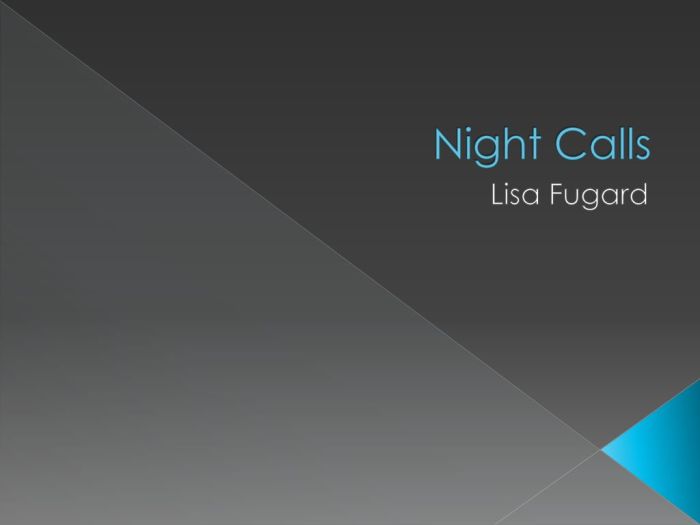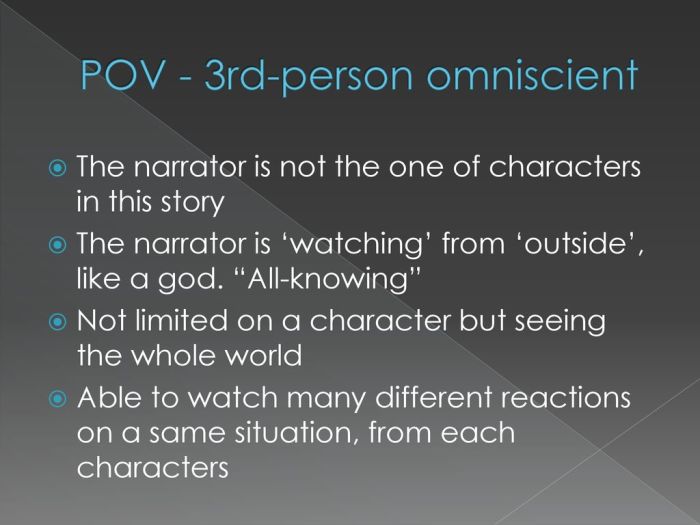Night calls by lisa fugard – In Lisa Fugard’s evocative play, Night Calls, a web of complex relationships and profound themes unfolds, inviting readers to delve into a world where the boundaries of identity, race, and connection are explored with raw emotional depth.
The play’s setting in South Africa during the apartheid era provides a backdrop against which the characters’ struggles and aspirations are poignantly revealed, making Night Calls a timeless and resonant work that continues to resonate with audiences today.
Play’s Overview

Lisa Fugard’s Night Callsis a poignant and thought-provoking play that delves into the complexities of family relationships, the search for identity, and the transformative power of love.
Set in a rural South African town during the apartheid era, the play centers around three main characters: Ansie, a young woman struggling with her identity and longing for connection; Pieter, her father, a conservative farmer haunted by his past; and Andrew, a stranger who arrives in town and challenges the status quo.
Central Conflict
The central conflict of Night Callsarises from the clash between Ansie’s desire for freedom and Pieter’s rigid adherence to tradition. As Ansie seeks to explore her own path and forge her own identity, she encounters resistance from her father, who is determined to preserve the family’s legacy and maintain control over her life.
Themes
Through the characters and plot, Night Callsexplores a range of themes, including:
- Identity and Belonging:Ansie’s search for her true self and her place in the world.
- Family and Relationships:The complex dynamics within the father-daughter relationship and the impact of family secrets.
- Transformation and Healing:The transformative power of love and the ability to overcome adversity.
- Social and Political Issues:The play’s setting during apartheid provides a backdrop for exploring issues of race, inequality, and the search for justice.
Character Analysis
The characters in “Night Calls” by Lisa Fugard are complex and well-developed, each playing a vital role in the play’s exploration of themes such as family, loss, and redemption.
Milly
Milly is the play’s central character, a young woman struggling with the aftermath of her father’s death and her mother’s subsequent withdrawal. She is initially portrayed as lost and adrift, unsure of her place in the world.
Night Calls by Lisa Fugard is a thought-provoking play that explores themes of family, identity, and the search for meaning. The play’s complex characters and poignant dialogue resonate with audiences, making it a compelling work of theater. For those looking to delve deeper into the world of mathematics, I recommend exploring ap calculus ab unit 1 frq . This resource provides a comprehensive overview of the unit’s concepts, including limits, derivatives, and integrals.
Returning to Night Calls by Lisa Fugard, the play’s exploration of the human condition remains a powerful reminder of the complexities and resilience of the human spirit.
As the play progresses, Milly begins to explore her own identity and find her voice. She develops a close relationship with Karel, a fellow musician, who helps her to process her grief and move forward with her life.
Relationship between Milly and Martha
Milly’s relationship with her mother, Martha, is strained and distant. Martha is unable to cope with her husband’s death and retreats into herself, leaving Milly feeling abandoned and alone.
Despite their difficulties, Milly and Martha eventually begin to rebuild their relationship. Milly learns to understand her mother’s pain, and Martha learns to let go of her grief and be there for her daughter.
Karel, Night calls by lisa fugard
Karel is a musician who becomes Milly’s love interest and confidant. He is a kind and supportive figure, who helps Milly to heal and find her own path.
Karel’s relationship with Milly is not without its challenges. He has his own demons to deal with, and he sometimes struggles to be there for Milly when she needs him most.
Symbolism and Imagery
Night Calls by Lisa Fugard employs powerful symbolism and imagery to enhance its themes and create a distinct atmosphere. The playwright’s use of light and darkness, as well as the significance of the telephone, contribute significantly to the play’s overall impact.
Light and Darkness
Light and darkness are prevalent symbols in Night Calls, representing hope and despair, respectively. The opening scene depicts a dim, cold room, reflecting the emotional state of the protagonist, Sarah. As the play progresses, the use of light gradually increases, symbolizing Sarah’s journey towards self-discovery and healing.
The final scene takes place in a sunlit room, suggesting a brighter future for Sarah.
The Telephone
The telephone serves as a central symbol of communication and connection in Night Calls. It represents Sarah’s longing for connection with others, particularly with her deceased husband, Robert. The frequent ringing of the telephone symbolizes the unresolved issues and grief that haunt Sarah.
The play explores the complexities of communication and the challenges of moving on after loss.
Historical and Social Context

Night Calls was written in the midst of South Africa’s apartheid era, a time of intense racial segregation and discrimination. The play reflects the social and political realities of this period, particularly the oppressive system that governed the lives of black South Africans.
The play portrays the complex and often fraught relationships between people of different races and classes. It explores the ways in which power and privilege shape these relationships, and the devastating consequences that can result from racial prejudice and discrimination.
Race and Class Relations
The play’s central conflict revolves around the forbidden love between Milly, a white woman, and Morris, a black man. Their relationship is met with strong opposition from both their families and the wider community, highlighting the deep-seated racial prejudice that permeated South African society at the time.
The play also explores the class divide that existed between white and black South Africans. Milly comes from a wealthy family, while Morris is a working-class man. This difference in social status further complicates their relationship and adds to the challenges they face.
Night Calls offers a powerful indictment of the apartheid system and its devastating impact on the lives of all South Africans. It is a reminder of the importance of fighting against racism and discrimination, and of the need to create a more just and equitable society.
Staging and Performance: Night Calls By Lisa Fugard

The staging of Night Callsis minimalist and evocative, creating an intimate and immersive atmosphere for the audience. The set design consists of a simple bedroom, with a bed, a dresser, and a window. The lighting is dim and atmospheric, creating a sense of mystery and unease.
Sound effects, such as the creaking of floorboards and the howling of the wind, add to the play’s unsettling atmosphere.The use of music and sound in the play is integral to the overall production. The haunting melody of a cello provides a backdrop to the action, creating a sense of foreboding and tension.
The sound of a ticking clock emphasizes the passage of time and the characters’ growing desperation.
FAQ Summary
What is the central conflict in Night Calls?
The central conflict revolves around Milly’s struggle to reconcile her racial identity and her desire for connection with both her white and black communities.
How does the play explore themes of identity?
The play delves into the complexities of identity, examining how race, class, and gender shape individuals’ experiences and relationships.
What is the significance of the telephone in the play?
The telephone serves as a symbol of communication and connection, representing both the desire for connection and the barriers that can divide people.
